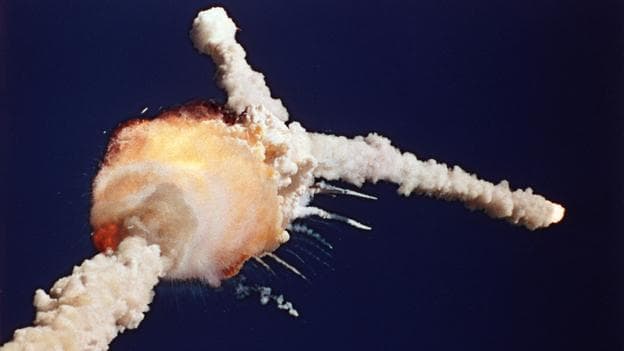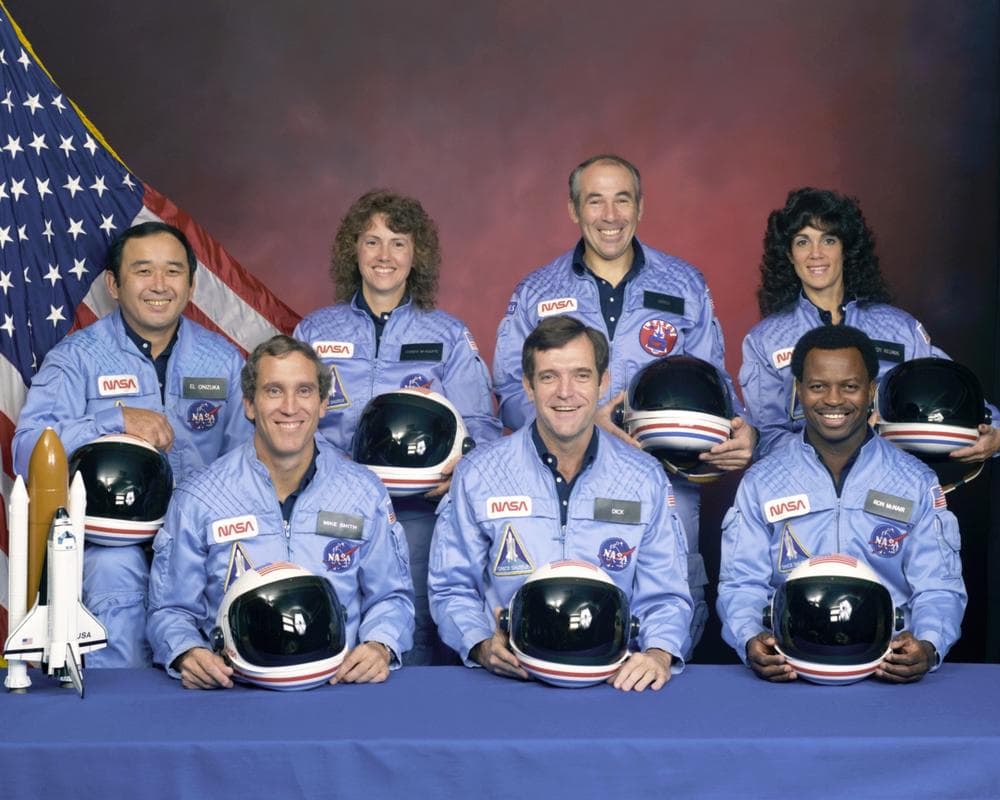Advertisement
25 Years Later, Challenger Disaster Still Painful


I was a space geek growing up. I went to Space Camp. I was the kid who started the Astronauts Club at my elementary school.
So 25 years ago, when the Space Shuttle Challenger was set to launch the first teacher into space, it was a big, big deal for me. My fifth-grade teacher, Mr. Hart, had applied to the program. He made it fairly far along in the process, too. But at 6-foot-3, NASA informed Mr. Hart he'd be bumping his head up against the ceiling of the shuttle's cockpit.
Instead, NASA picked the petite but charismatic Christa McAuliffe of Framingham, Massachusetts. McAuliffe was a history teacher at Concord High School in New Hampshire. But through the Challenger mission, McAuliffe's classroom would be transported miles above earth and her students would be the millions of children around the world - children like me - who were captivated by the mystery and possibilities of space.
That's why January 28th, 1986 still feels so recent and real to me. Mr. Hart had wheeled a big TV into the classroom. He brought popcorn and soda, and we pushed all our desks to the edge of the room and formed a wiggling dog pile of fifth graders on the floor.
I sat in the front, right at the foot of the television. I'd memorized the shuttle launch sequence and counted down along with the launch announcer... T-minus 6, we have main engine start, 4, 3, 2, 1, and lift-off!
Everyone cheered. But as I said, I was a total space geek, so I remember leaning over to Mr. Hart and saying, "But they still have to go through Max-Q!" That's space lingo for the maximum pressure and force the shuttle experiences at the sound barrier, after which the vehicle throttles up and powers into earth orbit.
But of course, Challenger never made it to orbit.
Seventy three seconds after launch, the shuttle was gone. In its place: smoke and debris falling back to the earth.
Advertisement
In my classroom, there was silence. No one knew what was going on, but we all knew something had gone horribly wrong. My big, burly fifth-grade teacher Mr. Hart was crying.
That's how I experienced the moment when everything changed for the American Space Program. WBUR's Bob Oaks saw it too. But not on TV. He was there at the Kennedy Space Center in Florida. At the time, Bob was a reporter for WEEI radio, in its old incarnation as a news station. Bob had a background reporting in New Hampshire where Christa McAuliffe was a teacher. And though he didn't know McAuliffe, he knew some of her friends and family.
WEEI sent Bob down to Cape Canaveral to cover the launch. "There were hundreds of reporters," Bob recalls. "Everyone thought it was going to be a great and positive story. People were wearing NASA regalia and NASA patches from many of the previous launches."
Bob also remembers how cold it was. The mission had already been scrubbed several times because of the cold, but on that January morning, NASA gave Challenger the go-ahead. Later investigation found that exposure to the unusual chill contributed to the failure of the solid rocket booster O-rings, which led to the explosion.
But at the moment of the disaster, no one knew what was going on. "It was confusion and disbelief," Bob says. "No one knew what to do and there was very, very little information at that point coming from NASA."
There was a pall over the entire country, Bob says. "The night of the launch, very late at night, I went out to eat dinner with a couple of reporters from New Hampshire. We went to a restaurant that was crowded with NASA workers. You could have heard a fork drop. No one was talking... days later when I returned to Framingham, Christa McAuliffe's hometown, [and] when I returned to Concord where she was a teacher, you could still feel the effects."
One moment in particular stays with Bob, and with me. It makes my news-hardened colleague tear up to this day. President Ronald Reagan had been scheduled to deliver the State of the Union address the night of the Challenger disaster. Reagan postponed the speech and instead delivered a television address that many consider one of his finest moments. Barely six hundred words, it ended:
The crew of the space shuttle Challenger honored us by the manner in which they lived their lives. We will never forget them, nor the last time we saw them, this morning, as they prepared for their journey and waved goodbye and "slipped the surly bonds of earth" to "touch the face of God."
(The iconic words, however, aren't Reagan's. They are quoted from "High Flight", a 1941 sonnet penned by World War Two fighter pilot John Gillespie Magee, Jr. The sonnet has a long history with NASA that pre-dates Challenger. Astronaut Michael Collins brought a copy of it with him on the Gemini 10 mission. The poem also appears on headstones of several aviators at Arlington National Cemetery.)
So here we are, on the 25th Anniversary of the Challenger disaster. It just so happens that this year, the entire shuttle program comes to an end.
When Space Shuttle Atlantis makes its final lift off in June 2011, there will be nothing to take its place. After 135 missions, NASA has no next-generation space plane. With the end of the shuttle program, stargazing kids in fifth grade lose one of their largest sources of inspiration and wonder.
There are private space projects in the works, and there's the International Space Station. But to me, it's not the same. For all the talk of returning to the moon, we didn't. For those who hoped for a manned mission to Mars, it doesn't exist.
Christa McAuliffe envisioned a different future, one she shared with PBS in an interview a few months before the Challenger flight. McAuliffe saw her mission as any teacher would: as an opportunity to push her students to dream well beyond the horizons they could see.
"They've got to get ready for this," she said. "Their grandchildren will probably be on space stations. There's going to be totally different fields. There will be space law. There's going to be business in space, and students have to prepare for that future.
"I really hope the students get excited about the space age because they see me, an ordinary person, up there in space."
This segment aired on January 28, 2011.